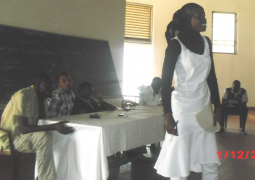Many of our readers will be shocked by the announcement made by the Secretary of State for Interior, Honourable Ousman Sonko, that there are an estimated ten million (10,000,000) firearms in the West African sub-region. This is an extraordinary number and has the potential to wreak havoc and mayhem in our sub-region.
It is very heartening however to see that the government is taking the issue so seriously. We must be very alert to this clear and present danger. The stability we enjoy in The Gambia must not be threatened by the illegal arms trade.
One would be a fool to think however that the problem is entirely with the black market element of the arms trade. Who is making these weapons? Who is profiting from the sales of these weapons? These are the questions we must be asking and actively seeking honest answers to.
The Interior Secretary of State made his remarks last Friday, at the Kairaba Beach Hotel, where he launched a cartoon publication against Small Arms and Light Weapons (SALW) entitled "My strength is in Peace."
He said that all efforts must be employed to ensure that arms proliferation is controlled. "The global campaign on small arms and light weapons needs to be intensified in all forms," he said. This is indeed true.
We also agree with Secretary of State Sonko in his statement that communities must be sensitised, youths must be involved while government and international agencies must be engaged to make sure they adopt and pursue policies and measures that will stem the spread of firearms in the sub-region. Again, as with so many other things, education has a vital role to play. As we have said many times in these pages, we are a small community in The Gambia and this makes it quite difficult for people to engage in illegal activity without it being public knowledge very quickly. If our communities and young people are educated on the extreme dangers of these weapons, they will be more likely to act in the interests of themselves and their communities in reporting the trade in illegal weapons if they believe it is going on.
The government recently tabed a bill in the National Assembly to control the possession of arms and ammunition in the country. This is a very positive step and the trend must continue.
Mr. Gerhard Doujak, Austrian Ambassador in Senegal, commended as significant the steps taken by the Gambia government towards the control SALW. He assured Austria's and the EU's championing of the fight and practical work to prevent, combat and eradicate the illicit trade in light weapons. He disclosed his country's provision of the huge sum of 530,000 euros this year alone to support different projects in Africa in the field of SALW.
While this is indeed commendable and very welcome, perhaps the EU members and other nations in Europe should look beyond the illegal trade and examine the legal one. The legal trade is the source of all weapons. Whether or not they become illegal later is a matter of semantics. As with so many other things, those with monitory interest in the production of weapons cream the profits while we in Africa suffer the miserable consequences. We want real action on the issue of arms control, not mere lip service. In the interim, until we get real action on the issue, we must tackle the plague head on ourselves to ensure the maintenance of stability in the nation.
"More than an end to war, we want an end to the beginnings of all wars."
Franklin Delano Roosevelt



